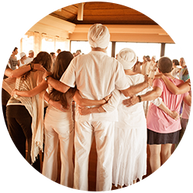Physical abuse
I felt helpless when my Dad beat me whenever I didn’t do what he told me. My father had a machine for a heart; it pumped blood, but he showed no feelings. One time, we were with our relatives for a party. I was wearing a ‘modern’ pair of pants, and my father yelled at me to change them. I refused. He got a stick out of the cupboard and beat me right in front of everyone. I was black and blue all over my body. I decided, you can have my body, but “You can’t have me.” I closed up. I lied to him. I didn’t trust him anymore and stopped trying to share anything with him. I felt imprisoned and suppressed my feelings so much I could no longer feel them. My mother beat me, too. Sometimes they told me that if I was not a good girl, they would send me away. I was never able to do anything right.
I was the oldest. It was my responsibility to be punished for anything my siblings did. We slept in a big room, and when they were laughing and playing at night, I’d be in terror. I have a strong image of my father in darkness. He’d come directly to me, and I’d get badly beat. He’d start with a spanking, when I squirmed, he hit me everywhere. Belts, buckles, hands. And yet, I loved my father.
I have no memories up to age six. When I was six or seven, I was convinced that I was swapped at the hospital and given to the wrong family. My father would beat us with shoes or belts. Sometimes my parents were both beating us together. My mother was crying while she was beating us. My father was really aggressive in these situations. I could see all this aggression in his eyes. When I would see his eyes looking like this, I would be filled with fear. In school, I had a lot of fights.
My mother’s face was always closed and angry. I could not see any love there. When I did something wrong, she would say, “Wait until your father comes home, he will teach you.” I would be filled with fear all the rest of the day, my stomach so upset that I could not eat. Sometimes I would try to hide before he came home, but there was no hiding from him. He would take the belt off his pants and tell me to lie down on his lap and begin to beat me with the belt. If I cried, he would say, “You must be like the Indian brave who knows no pain.” After the beating I was required to stand in front of both my parents and tell them why I deserved to be beaten. If I could not come up with a reason, I would have to, at least, apologize for being a bad boy, and promise that I would do better. Sometimes they would explain that they beat me because they loved me and wanted me to become a good boy. But when I looked at them, I never saw or felt any love.
The fear grows and grows, as the child is unable to know what might trigger those dreaded words, “Wait until your father comes home.” The inner conclusion, the wound or story which takes place in the subconscious, is, more or less: “I am not safe anywhere. There is no hope for anything to ever be better. I am better off shutting down and not hoping, not feeling.”
In cases of truly egregious physical abuse, the pain and fear the child experiences mostly results in them becoming hateful, angry adults, who perpetuate corporal punishment of children down through hundreds of generations.
I was the oldest. It was my responsibility to be punished for anything my siblings did. We slept in a big room, and when they were laughing and playing at night, I’d be in terror. I have a strong image of my father in darkness. He’d come directly to me, and I’d get badly beat. He’d start with a spanking, when I squirmed, he hit me everywhere. Belts, buckles, hands. And yet, I loved my father.
I have no memories up to age six. When I was six or seven, I was convinced that I was swapped at the hospital and given to the wrong family. My father would beat us with shoes or belts. Sometimes my parents were both beating us together. My mother was crying while she was beating us. My father was really aggressive in these situations. I could see all this aggression in his eyes. When I would see his eyes looking like this, I would be filled with fear. In school, I had a lot of fights.
My mother’s face was always closed and angry. I could not see any love there. When I did something wrong, she would say, “Wait until your father comes home, he will teach you.” I would be filled with fear all the rest of the day, my stomach so upset that I could not eat. Sometimes I would try to hide before he came home, but there was no hiding from him. He would take the belt off his pants and tell me to lie down on his lap and begin to beat me with the belt. If I cried, he would say, “You must be like the Indian brave who knows no pain.” After the beating I was required to stand in front of both my parents and tell them why I deserved to be beaten. If I could not come up with a reason, I would have to, at least, apologize for being a bad boy, and promise that I would do better. Sometimes they would explain that they beat me because they loved me and wanted me to become a good boy. But when I looked at them, I never saw or felt any love.
The fear grows and grows, as the child is unable to know what might trigger those dreaded words, “Wait until your father comes home.” The inner conclusion, the wound or story which takes place in the subconscious, is, more or less: “I am not safe anywhere. There is no hope for anything to ever be better. I am better off shutting down and not hoping, not feeling.”
In cases of truly egregious physical abuse, the pain and fear the child experiences mostly results in them becoming hateful, angry adults, who perpetuate corporal punishment of children down through hundreds of generations.


